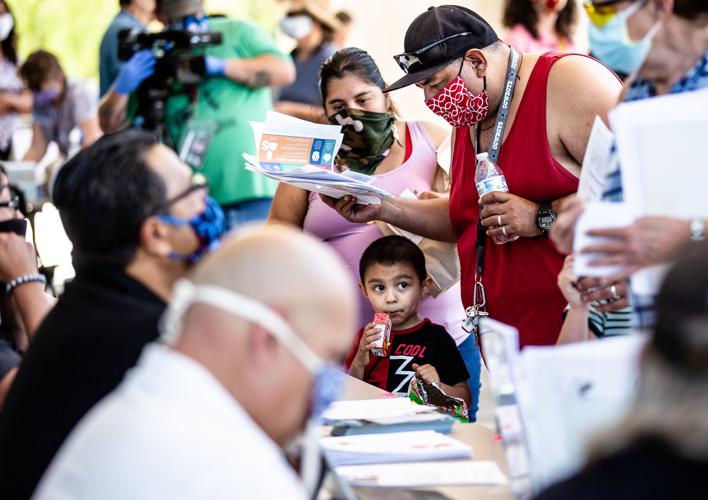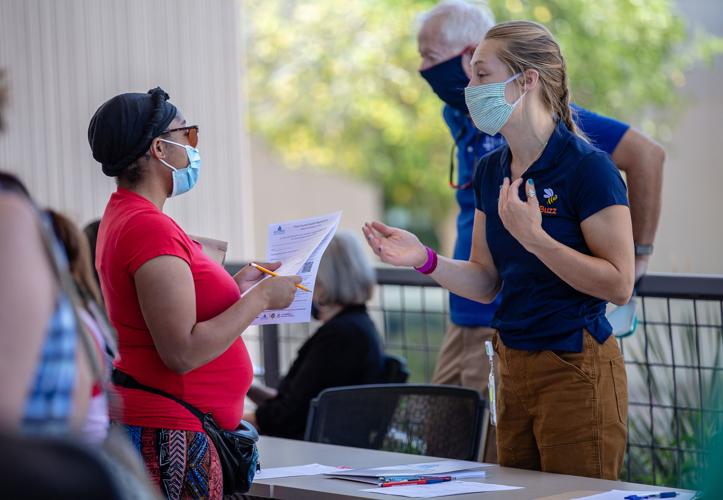Eviction hearings in Pima County will resume Monday with nearly 600 scheduled over the next few weeks, ending a reprieve brought on by the coronavirus pandemic.
What’s different now is that people facing eviction due to COVID-19 hardships, which include financial and health-related issues, can ask the judge for a temporary reprieve based on Arizona Gov. Doug Ducey’s March 24 executive order.
But advocates say that order, while obviously helpful in the short term, does not go far enough — and that many Arizona residents will soon be overwhelmed with rent debt and late fees. The order is set to expire July 22, which could mean a disastrous August if landlords don’t work with tenants.
“While (the executive order) has been keeping most people in their homes longer, we’re going to hit a breaking point where the situation is just as dire,” said Amanda Rutherford, staff attorney with Step Up to Justice, a law center that provides free legal advice to people facing evictions.
“It’s an enormous burden to put on tenants.”
To try to help, Stacy Butler of the Innovation for Justice Program at the University of Arizona’s James E. Rogers College of Law has submitted a request with Ducey’s office to amend the order.
“Without intervention directed at housing stability and rental debt, a surge of evictions, displacement and homelessness is imminent,” Butler wrote in a May 22 letter to Ducey. “In the middle of this global pandemic, mass evictions and homelessness will be disastrous for our community and our economy.”
The brief included letters of support from several local organizations including the Pima County Housing Center, Primavera Foundation, Southwest Fair Housing Council, Step Up to Justice, and United Way of Tucson and Southern Arizona.
One of the greatest concerns is that people who are evicted because of COVID-19 will find it difficult to find other housing, and already overburdened agencies will not be able to help. An eviction judgment stays on a credit report for seven years, Butler wrote to Ducey, and many will struggle to find funding for the first month’s rent and security deposit usually needed for a new place.
On average and without the financial fallout from the pandemic, there are 14,000 evictions filed each year in Pima County, Butler said, and about 75 percent result in an eviction judgment against the tenant.
At this point, there are no plans to amend the order or extend it beyond July 22, said Patrick Ptak, director of communications for Ducey, although Ptak said that date could be reevaluated as it gets closer.
Instead, Ptak said, there are detailed guidelines being provided by the courts and the constables about how people should proceed if they are having trouble paying rent due to COVID-19.
“First and foremost, it’s been stressed for tenants to provide advanced notice to the landlords and to provide documents that show (COVID-19) hardship,” he said. “Tenants should get on the same page with the landlord and work out an agreement that’s mutually beneficial.”
Ptak said the order does not suggest tenants stop paying rent altogether but continue to make partial payments as they are able.
“We’ve worked hard to get assistance out to families,” he said, citing the $1.4 billion in unemployment assistance that has been provided to Arizona residents through the state’s Department of Economic Security.
He acknowledged there are often long waits for assistance right now and that people should also communicate that with their landlords, many of whom are also facing financial hardships as a result of the pandemic.
Lauren Romero of the Arizona Multihousing Association said a common misconception is that Arizona rental properties are mostly owned by corporations with a lot of money and many resources.
What’s actually true, she said, is that the majority of Pima County’s rentals are owned by families who rely on rent to pay their own bills. On average, she said, only nine cents per dollar goes to the landlord as profit.
Landlords who have federally backed loans cannot evict tenants based on the federal eviction moratorium. It’s up to the lenders to offer a temporary reprieve on mortgages, she said, and the majority of the people Romero hears from are not receiving that option.
What’s happening, essentially, is the private rental market is being turned into public housing, and the tenants are not yet receiving help.
The major issues that are holding everyone back? A lack of funding, a backlog of applications for assistance and the tedious amount of paperwork it takes to complete an eviction prevention application.
“Applying for jobs everywhere”
About 60 people attended an eviction prevention resource fair Thursday at Pima County Justice Court, 240 N. Stone Ave., and several shared stories with the Arizona Daily Star about what they are experiencing.
Midtown resident Ruben Lopez is scheduled for an eviction hearing this week and came down to learn more about what kinds of health and financial challenges might bring a reprieve. Lopez said he was working as a crossing guard for Tucson Unified School District when Ducey ordered the shutdown.()
In addition to job loss, Lopez said he has medical challenges that put him at risk, including multiple sclerosis and a heart condition, and so he is concerned about going back to work. For now, he is hoping Ducey’s executive order will help him keep his housing.
Other people said they had been waiting weeks for rental assistance through the county or for unemployment checks through the state, but nothing has come through yet. Several said they are maxing out credit cards to pay their bills. Others said their landlords are working with them, and they attended the fair because they wanted to find out what more they could do to get help.
Brooke Moses is renting-to-own a trailer, waiting for unemployment to come through and working for Door Dash in the meantime. She says she sometimes earns barely enough to cover the gas — and she’s worried about eviction.
Her situation is complicated by the fact she owes back child support to her ex-husband and so, she has been told, any assistance she receives will have that deducted.
“I’m applying for jobs everywhere, every day,” she said. So far, nothing has come through.(t)
These are the same kinds of stories that Matt Caylor is hearing from clients who call in for help with Step Up to Justice, where he is currently a fellow. He said some clients said they have landlords who are trying to get around the governor’s order.
“It’s something of a crisis here in Tucson, I’d say, with the scale of people who are out of work and need help paying rent,” Caylor said. “I have seen a few cases where the landlords have lost patience and are trying to figure out a way not to renew the lease.”
Some tenants told Caylor they have received letters saying they have to leave their homes even though there’s not an eviction proceeding scheduled, which is illegal.
Step Up to Justice attorneys encourage people to seek legal advice as soon as they can and before an eviction hearing is held. He said they also encourage tenants to not rely on simply talking to the landlord.
“You need to document everything so you can properly defend yourself,” he said, “and so it’s not the he-said, she-said game.”
“Making this work”
Until this week, eviction hearings have been relatively scarce since the pandemic started, with one judge available weekly .
Those that have been carried out have mostly been criminal evictions, meaning the tenant had allegedly committed a crime, such as damaging the property or selling drugs from the home, for example.
“We’ve had mental health services and police assist on more of these than we usually do,” said Kristen Randall, constable for midtown’s Precinct 8.
The other evictions Randall has seen go through were ones where people met the executive-order criteria but were evicted anyway due to a material breach, meaning the terms of the lease were violated.
“These have been the heartbreaking ones,” she said. In one case, she said, there were cars in the driveway that didn’t have license plates on them. In another, the backyard was littered with boxes. This, coupled with nonpayment of rent, has cost people their housing.
“Normally, we don’t see that many material-breach evictions,” she said. “There’s definitely been an uptick.”
Constable Bennett Bernal of Precinct 6 said he has been visiting people with pending court dates to let them know about the governor’s executive order. He estimates about half of the people he has sought out have either already moved or are preparing to leave June 1.
Many, he has been told, left after they received stimulus money or help from another agency and, perhaps, found a cheaper place to live.
Other tenants he has contacted have shared that their landlord is working with them on a plan and so the eviction hearing won’t be necessary.
Overall, Bernal is hopeful it won’t be quite as bad as anticipated.
“We’ve got people really stepping up,” he said. “People are helping other people and making this work.”
“Can’t fundraise our way out of this”
Many of the women stopping by Sister Jose Women’s Shelter these days for a little help with food or personal items tell director Jean Fedigan they are afraid of eviction.
The shelter, at 1050 S. Park Ave., is housing far fewer women right now in order to meet the Center’s for Disease Control and Prevention guidelines. At the time COVID-19 hit, there were 34 women living there, and Fedigan said the shelter has since transitioned all but 12 into other housing, including motels the city of Tucson and the county have set up to help with homelessness.
Under CDC guidelines, only 24 would be allowed, but Fedigan said the shelter is not bringing in more for now in order to protect the women who have been sheltering together for all this time.
“I’m trying really hard to build an extension,” she said, “a small area that will allow me to put enough cots to open back up to 35 beds.”
Another local program that helps the homeless is the Primavera Foundation, which provides more than 7,000 Southern Arizona residents with housing help and other emergency services annually.
In dealing with the fallout of the COVID-19 pandemic, executive director Peggy Hutchinson wrote a letter supporting changes to broaden Gov. Ducey’s executive order. She said Primavera’s housing options are currently full, and the program had to reduce capacity at its men’s shelter from 80 to 40.
“The COVID-19 pandemic has now totally overwhelmed our Southern Arizona community with thousands of residents experiencing homelessness and thousands more facing eviction as unemployment claims skyrocket,” she wrote. “Our public sector and nonprofit community systems are unable to address the growing numbers of community members at risk of homelessness.”
Hutchinson said Primavera also solicited help from longtime supporter and local businessman Jim Click, who agreed to do a public service announcement encouraging landlords to work with tenants. The PSA by Click, co-owner of the Tuttle-Click Automotive Group, is now airing on local radio stations in both English and Spanish. ()
The focus, Hutchinson said Friday, has to be on preventing rather than just postponing evictions.
“There’s not enough resources to address the eviction crisis that could come out of COVID-19,” she said. “We can’t fundraise our way out of this.”
“I have seen a few cases where the landlords have lost patience and are trying to figure out a way not to renew the lease.” Matt Caylor Fellow with Step Up To Justice





